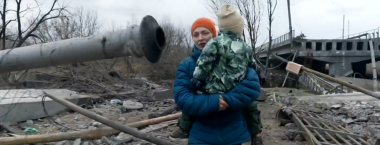
Why the European Court of Human Rights Remains Key to Justice for Ukraine
Ukraine’s latest request to the European Court of Human Rights (ECtHR) to order Russia to...
07 September 2022
22.08.2016
As of June 1, 2016, 1562 persons serve a life sentence. These are 326 persons less than in 2014, but not because Petro Poroshenko granted pardon to them. These three hundred died or stayed in the occupied territory. Last year our president did not grant pardon to any person, who serves a life sentence. He even vetoed the imperfect law that increased chances of the prisoners to walk free. The current legislation on life sentence is a real problem in Ukraine. It can be perfectly illustrated by the case of Volodymyr Petukhov, who was arrested in June 2001. His verdict shows that he was a member of a gang, robbing and killing rich inhabitants of Kyiv. He denies participation in this gang and its crimes, but after review of the case in December 2004, the court found him guilty and sentenced to life imprisonment.
The prisoner complains that in the Kiev detention facility №13 the personal behaved very badly with him, and this caused grave consequences. Vladimir Petukhov gave his words to the lawyer Iryna Kovalchuk.
“I was in a large cell. There were two persons with an open form of tuberculosis among others. A month later, I felt bad, appetite disappeared, temperature jumped. For two months I insisted on getting an X-ray. The food was awful, the camera was always full, and often we did not have enough air. After all, doctors made the diagnosis – extremely advanced forms of tuberculosis. People and I were beaten when we required medication. The first day I was beaten because I wanted to know where I got, what treatment I need, and why a doctor has not yet come. After that, I went to the court with a demand to release me because of my health problem – incurable tuberculosis. But the judge refused to ask my doctor since realized that then he will have to decide on my release,” he says.
Volodymyr Petukhov understood that the Ukrainian court could not guarantee his rights, so he together with the lawyer applied to the European Court. In 2010, ECHR found a violation of the rights of Volodymyr Petukhov on the adequacy of medical care in detention, the length of proceedings and the lack of an effective remedy. As a result, Ukraine paid EUR 8,000 for non-pecuniary damage to Volodymyr Petukhov.
But the case did not end there. As Volodymyr did not consider himself guilty, he began to seek a review of his case and release.
“Everyone knows that I am not a killer. I was put in a frame, and there were witnesses,” he said. Later Volodymyr Petukhov decided to appeal to the Ukrainian Helsinki Human Rights Union.
“I have asked every organization. UHHRU is the only organization that brings all things to an end. I hope that after the intervention of the UHHRU lawyers, the authorities will hear me. I will be able to survive and get out of prison. I ask for myself only one thing – a new trial in the court of the first instance. My false evidence, on which sentence was based, was beaten out of me,” Volodymyr Petukhov says.
The technology of the release of life convicts in Ukraine is very complicated. According to the lawyers of the Ukrainian Helsinki Human Rights Union, pardon procedure has some shortcomings. It makes the release of the Ukrainian prison almost impossible. ECHR drew attention on it. For the first time, the European Court decided to examine whether there is any possibility to release convicts earlier. So the Court communicated the case of Volodymyr Petukhov with the Ukrainian government and asked some important questions. Furthermore, ECHR has raised the question of systematiсity of the violations in Ukraine. The UHHRU Strategic Litigation Center joined the case, as considered the question raised by the Court is extremely important. Responding to questions from the European Court, the Center analyzed a standard procedure, which gives a possible chance of liberation of life convicts and found it extremely unsatisfactory. In their objections and in response to the communication with ECHR to the Ukrainian government, the Union’s lawyers said:
In November 2015, MPs supported the Bill prepared by Viktor Chumak and Iryna Lutsenko №2292 “On Amendments to Certain Legislative Acts of Ukraine Regarding the Replacement of Life Imprisonment with the More Lenient Sentence.” In his text, “if a court replaces life imprisonment with a term of imprisonment of twenty-five years, the term of the person’s stay in prison is fully counted.” However, Petro Poroshenko refused to sign the law. He said, the introduction of conditional releases from the punishment of life convicts “eliminates the legal institution of pardon of such people.”
Mykhailo Tarakhkalo, the Director of the UHHRU Strategic Litigation Center, says that today there is no effective mechanisms to address the problem of a life sentence.
“International and the national law recognize that the primary purpose of any sentence is a correction of a man. A convicted person should be able to correct his/her behavior to rely on pardon in future. Here the Ukrainian legislation very seriously lags behind European, since it does not provide such possibility. The only way to walk free for life prisoners is a procedure for a presidential pardon. Unfortunately, this procedure is inefficient. ECHR has put the issue of systematic violations of the 46th article of the European Convention. I think the violation is systematic, it will have to be corrected, and pay huge compensation to prisoners whose rights have been violated,” he says.
The lawyer of Volodymyr Petukhov complained about some issues that affect the possibility of his release. The European Court comprehensively put these questions to the government of Ukraine. Since 2016, when ECHR has started to communicate the case to the Ukrainian government; her UHHRU lawyers have also joined the process. Currently, all documents are ready and are in the European Court.
“The European Court in the text of its communication stresses the structurings of the problem. Such cases usually become leading in the practice of the country. We now look forward to the ECHR decision that will change the fate of Petukhov and thousands of people who are in the same situation,” says Mikhail Tarahkalo.
If you find an error on our site, please select the incorrect text and press ctrl-enter.

Ukraine’s latest request to the European Court of Human Rights (ECtHR) to order Russia to...
07 September 2022

The family, twice refugees, ask for help from UHHRU – in 2014, the spouses Yarovoy...
27 May 2022

We would like to offer you the Digest of the Ukrainian Helsinki Human Rights Union,...
22 December 2021

We would like to offer you the Digest of the Ukrainian Helsinki Human Rights Union,...
18 November 2021